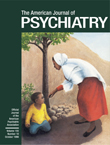Symptom Exacerbation of Vocal Tics and Other Symptoms Associated With Streptococcal Pharyngitis in a Patient With Obsessive-Compulsive Disorder and Tics
To the Editor: Infection with group A β-hemolytic streptococci may produce or worsen tics and obsessive-compulsive symptoms in vulnerable children and adolescents (1). This can occur several hours before pharyngeal inflammation is noticeable. We report acute worsening of vocal tics, obsessions, depression, and anxiety associated with streptococcal pharyngitis in an adult with obsessive-compulsive disorder (OCD), tics, and depression.
Ms. A is a 50-year-old woman whose compulsions involving symmetry and obsessions of embarrassing herself began at the age of 7–8 years. Blinking and vocal tics (throat clearing, coughing) began at age 12–13; phonic tics and OCD, including obsessions of harm coming to loved ones and compulsive arranging, persisted in adulthood, together with recurrent depression that had begun at age 12–13. In adulthood, Ms. A’s OCD and depression, although relatively treatment refractory, responded to combined paroxetine, clomipramine, valproate, and clonazepam with stable improvement for 18 months. During this period, two episodes of apparently viral upper respiratory illness occurred without change in psychiatric symptoms.
Ms. A had acute marked worsening in mood and obsessions 6 hours before the onset of sore throat, headache, myalgias, and fever. The next day, phonic tics and obsessions markedly increased. Two days later, both Ms. A and her psychiatrically healthy 9-year-old daughter, also experiencing sore throat and fever, had positive rapid streptococcal tests, and Ms. A began a regimen of amoxicillin. When she was nearly afebrile 2 days after that, she experienced her first-ever panic attack, with palpitations, air hunger, chest pressure, and fear of impending doom lasting minutes. The next day, her obsessions, vocal tics, and mood began to improve. One week later, all symptoms decreased to prior levels. Ms. A’s psychotropic medication remained unchanged throughout this episode.
We believe this is the first report of the worsening of neuropsychiatric symptoms associated with streptococcal infection in an adult. That this patient’s symptom exacerbation included depression and the onset of panic symptoms suggests that association between streptococcal infection and neuropsychiatric symptoms may not be limited to OCD and tics. Although this patient may have simply had nonspecific decompensation during this febrile illness, there were no exacerbations during other febrile illnesses, and the course of her symptoms did not mirror the fever, arguing against this possibility. Notably, the OCD and tics were familial, with similar illness beginning at age 7 in another daughter. Vulnerability to streptococcal-associated rheumatic fever and Sydenham’s chorea is associated with the D8/17 B cell antigen, which appears heritable. Recently, a group of childhood-onset OCD patients, including adults, all tested positive for D8/17, in contrast to a small proportion of healthy comparison subjects (2). Some adults with OCD may, therefore, be susceptible to the neuropsychiatric effects of streptococcal infections, a possibility that appears worthy of clinicians’ attention.
1. Swedo SE, Leonard HL, Mittleman BB, Allen AJ, Rapoport JL, Dow SP, Kanter ME, Chapman F, Zabriskie J: Identification of children with pediatric autoimmune neuropsychiatric disorders associated with streptococcal infections by a marker associated with rheumatic fever. Am J Psychiatry 1997; 154:110–112 Link, Google Scholar
2. Murphy TK, Goodman WK, Fudge MW, Williams RC Jr, Ayoub EM, Dalal M, Lewis MH, Zabriskie JB: B lymphocyte antigen D8/17: a peripheral marker for childhood-onset obsessive-compulsive disorder and Tourette"s syndrome? Am J Psychiatry 1997; 154:402–407Google Scholar



